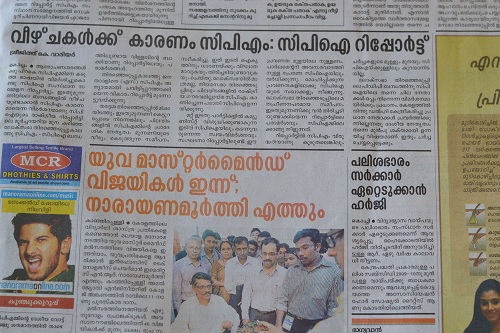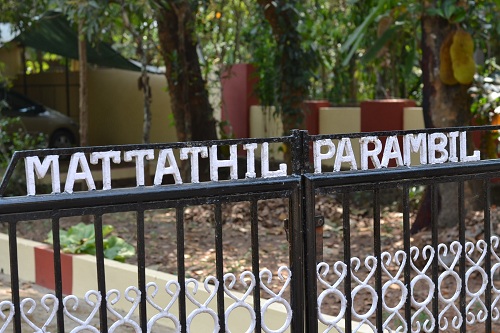A Minor Diversion’s posting frequency will fall until February 23rd. We are in Myanmar, where internet access is not a guarantee. I’ve set up these posts to go live while we are away. Even though they are about our time in India, I didn’t want to miss sharing some final Kerala experiences with you. We’ll have stories from Myanmar once we are back.
I am usually quick with languages. Though English is the only language in which I can claim currently proficiency, at some point in my life I have been fluent in French, Arabic, Japanese and (almost) Hindi. When we’ve traveled to Spanish, Portuguese and even Thai locations, I manage to pick up basic phrases to get by. I have never met a language as elusive as Malayalam. I can’t understand how Sandeep, who can’t even count to 10 in French (a language he studied for two years), can ramble on in Malayalam.
To me, Malayalam sounds like a long string of gargling. There doesn’t seem to be much room for punctuation. Just rambling on and on in rounded vowels peppered with the occasional gluttoral consonant. The fact that Malayalam is the longest palindrome should provide some warning in itself. Not to mention that the writing looks just as the spoken word sounds.

I’ve given up on the language. My tongue just refuses to twist like that and I don’t have enough lung capacity to hold my end of a conversation. Instead I am focusing my efforts on mastering names. This in itself requires time and dedication. So far, here are some of my learnings.
Everyone Has a Place
Kerala culture is still traditional and hierarchical. Unless someone is your equal in age and esteem, then they are referred to with some standing. For example, a wife will never refer to her husband by first name only, but add the suffix “cha” or “chayan” meaning elder brother. Amma calls Sandeep’s dad “Sunny Chayan”. I have never, in the 9 years I have known her heard her say “Sunny” even when referring to him in conversation. He, by contrast calls her “Eddy”, which literally translates into “she.” It’s not rude, it’s just the way a husband refers to his wife. Amma calls me “Diyakutty” and Sandeep Monei” which translates to “Diya little girl” and “little boy”.
Most People Have Nicknames
I don’t know much about the Kerala Hindu and Muslim practices, but in Christian households, almost everyone has a formal name such as “Thomas” “Joseph” or “Maria” but is also given a pet name such as “Jibu” “Tintu” or “Minu”. It is also highly fashionable to rhyme the nicknames within the family. Sandeep and his brother Sanoop are an example. Even more obvious is one branch of the family tree with four sisters named “Merin” “Sherin” “Terin” and “Jerin”.
Nicknames Stick
Many of these nicknames are given according to age and relative standing within the family. Some common ones are “Baby”, “Kochamol” meaning small girl or “Kunimon” meaning small boy. The family and entire village calls the person by their nickname, so as time passes, the formal name siezes to matter. This is how a 40 year old man ends up with the name “Kunimonchayan” which means small boy elder brother or a 90 year old woman with “Babykochamma” which means baby small mother.
Family Names are Usually Tongue Twisters
Traditionally, last names are the names of the family house. Padinjarekalathil and Kulathuvayalil are examples. These translate into “west property” and “pong paddy fields”, respectively. Today, most people adopt their nicknames as first names and formal names as last names. The family name, or house name, is used to explain where one is from and to which family tree he belongs. That’s how Sandeep’s father became Sunny Luke. If we’re being true to tradition, then Sandeep’s family name is Mattathilparambil. Somehow I don’t think I would have let go of my maiden name for Diya Mattathilparambil.

Cultural immersion usually requires language mastery. Unfortunately, for me, Malayalam has come with its challenges. In this case, if I manage to follow the names, I’ll consider myself somewhat immersed.

Diya , I laughed my heart out after going through your description of Malayalam language.I have inter acted with Phillo & I have observed the same mannerisms as you mentioned in your write-up.Most of the Keralites swing their heads in synchronizing with the flow of rounded words.Yes, some of their names are a real tongue-twisters & difficult to pronounce.When I was in school , my Hindi pundith by the name of Shri.Kuttan Pillai had an heavy Malayalam accent. Diya, at one of the Parties where my daughter danced to the Hindi song based in Kerala which goes like kuruvalle kuruvalle & no sooner this song came up Phillo was all smiles.By the way I am from Hyderabad & I strongly recommend you to visit that historic City which is cosmopolitan city like Mumbai.
That’s so funny that you wrote that. Thanks for sharing. Amma is actually with me now and laughing.
I definitely agree with you that Malayalam is not an easy language to learn! I still struggle with it after all these years!!
I found the names so fascinating I had to do a blog post. So are you Geethakutty or Geethamol 🙂
This is hilarious! So true – especially the comparison to gargling. Helps soften the throat for all those fish bones!
Haha. I have no idea how you and Sandeep learnt…